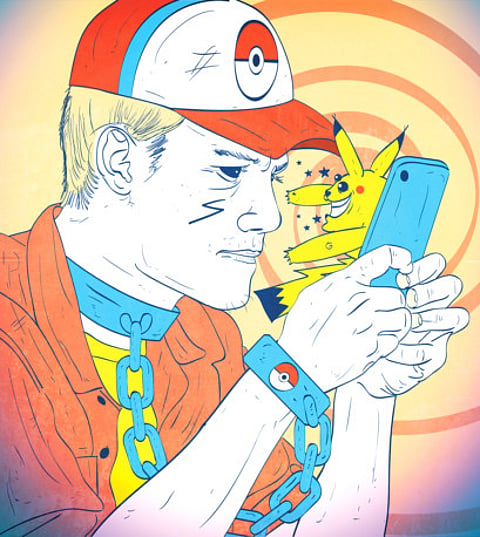Ad industry desperately chase Pokémon Go
Agencies are looking at everything from app advertisements to product placements

Dubai: Never mind your kids. The ad industry is chasing Pokémon just as desperately as they are, but with hopes of turning the “pocket monsters” into cash. Pokémon Go debuted a month ago to huge success, topping app stores in the US and Australia soon after its limited released.
The augmented reality game, which has players running around the real world chasing Pokémon characters on their smartphone screens, uses location based technology and a customized version of Google Maps.
Now ad agencies are asking, “How can we get involved?”
Augmented reality is giving us a new way to reach consumers, Kamal Dimachkie, executive regional manager at global ad agency Leo Burnett, told Gulf News by telephone. Consumers have built up a tolerance to traditional advertising, he said.
“Engaging with them requires a bigger effort, requires more involvement, requires innovation (sic).”
The success of Pokémon Go could be just the lifeline the ad agency has been waiting for, particularly in the Middle East where marketing budgets have contracted as the economy slows.
The global gaming market will be worth as much as $99.6 billion in 2016, according to market research firm Newzoo, which is 8.4 per cent more than last year. And for the first time, mobile gaming will overtake PCs and consoles, with Newzoo expecting the segment to make $36.9 billion this year.
Companies are already lining up to promote themselves on Pokémon Go. McDonald’s in Japan is paying developer Niantic to make its stores “pokéstops,” where players converge to collect Pokémon.
“From the retail perspective, the game has definitely opened up an opportunity here,” Chris Integlia, creative director at Dubai-based retail consultancy Limelight Creative Services, told Gulf News by telephone. “The game itself will open up a lot of opportunities for retailers once they can actually ask the provider to pay for a fee that attracts customers.”
A New York pizzeria said sales increased by 75 per cent after it purchased a $10 in-app upgrade that attracted Pokémon characters to its store and subsequently drew in players, the New York Post reported on July 12.
Marketing clients in the Middle East have already made “quite a few calls” asking to how they can get in on the buzz, Hoshi Siganporia, chief executive of Dubai-based ad agency The Big Idea, told Gulf News by telephone.
However, the game’s sudden success has meant that it is still not clear what the opportunities will be, especially in the Middle East, he said.
Pokémon Go had a limited rollout with the game first available in Australia and the US, though has since been expanded to countries in Asia and Europe. It is still not officially available in the Middle East but that has not stopped players in the region from downloading it after making a few relatively easy changes to their smartphone settings.
Before the McDonald’s Japan deal, developer Niantic said that it would allow companies to pay to have their locations featured in the game. Niantic is also behind augmented reality Ingress that saw meteoric success in the US in Japan, though not to the same level as Pokémon. Pharmacies, cafe’s, convenience stores and banks all paid to have their locations featured in the Ingress portal.
Companies will be charged on a on a “cost per visit” basis for their “sponsored locations,” Niantic chief executive John Hanke told the Financial Times on July 13. It would work similar to the “cost per click” method used in Google’s search advertising, he said.
“What brands need to do is find a natural environment for their brands and for their messaging to be there so that consumers want to interact with them,” Dimachkie said.
Another idea being looked into is whether companies could pay to have their products built into the game, which the characters and players would have to interact with.
“In the same way you have product placements you have in movies, what’s to prevent that from happening?” Dimachkie asked.
Other possibilities include companies building their augmented reality games
Shopping centres could develop their own games where shoppers collect vouchers redeemable in the mall, Integlia said. Proprietors could then monetize the online – or augmented reality – presence of their tenants if they are able to prove that they have increased their revenue, he said.
Zain, one of the largest mobile operators in the Middle East, is looking at how augmented reality games can fit into their revenue stream.
There is more for operators than just making money off the data usage, Juha Korhonen, Director of Innovation and Digital Services at Zain Group, told Gulf News by telephone. One possibility is for an operator is to tie up with developers to includeprizes into the game that players can redeem with the telco company such as vouchers or extra data, whilst telco’s could also work with developers to promote the game on a revenue sharing basis, he said.



